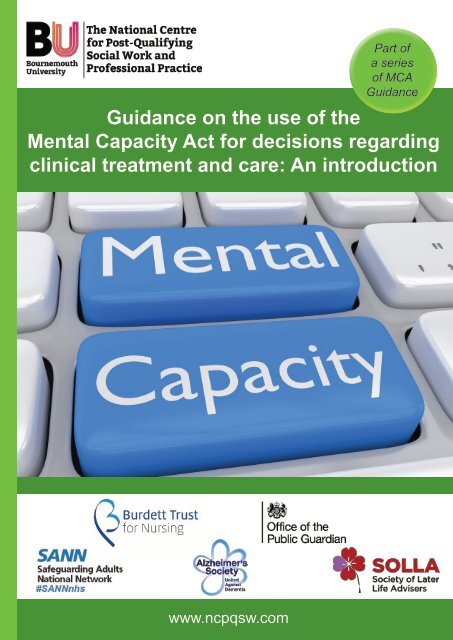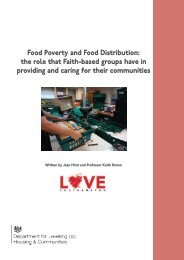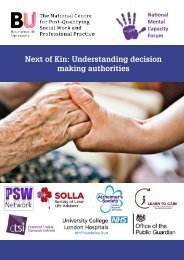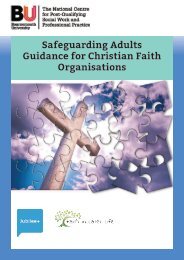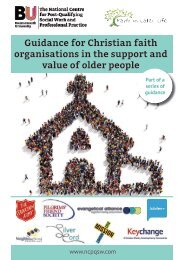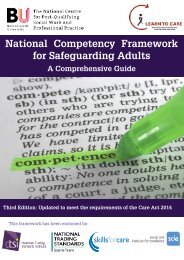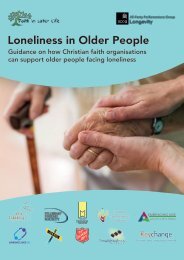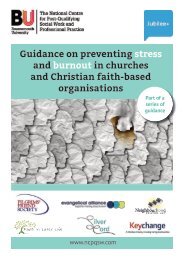0-Mental Capacity
The Mental Capacity Act principles should govern all decisions regarding care and treatment –in whatever setting and situation. They protect the rights of individuals, promote dignity, autonomy and respect of the person - their beliefs, values and wishes; they promote person-centred care, and ensure that where the individual cannot make their own decision, decisions regarding care and treatment are made in the Best Interests of individuals at that time.
The Mental Capacity Act principles should govern all decisions regarding care and treatment –in whatever setting
and situation. They protect the rights of individuals, promote dignity, autonomy and respect of the
person - their beliefs, values and wishes; they promote person-centred care, and ensure that where
the individual cannot make their own decision, decisions regarding care and treatment are made in the
Best Interests of individuals at that time.
Create successful ePaper yourself
Turn your PDF publications into a flip-book with our unique Google optimized e-Paper software.
Part of<br />
a series<br />
of MCA<br />
Guidance<br />
Guidance on the use of the<br />
<strong>Mental</strong> <strong>Capacity</strong> Act for decisions regarding<br />
clinical treatment and care: An introduction<br />
www.ncpqsw.com
Foreword<br />
One of the outcomes of this work has been the production of a new text - Demystifying <strong>Capacity</strong>:<br />
A guide for health and social care professionals. Just at the time of the final production of this<br />
new book, Covid 19 hit the world with ramifications that we are still feeling and coming to terms<br />
with. As a result of the impact of Covid 19, many health and social care professionals will be<br />
facing a huge rise in the number of clinical decisions they will need to make where capacity and<br />
consent for treatment and care will be significant and critical issues.<br />
We have therefore produced a series of brief guides to help all health and social care<br />
professionals navigate through and apply the principles of the <strong>Mental</strong> <strong>Capacity</strong> Act for decisions<br />
regarding clinical treatment and care. These are available to download for free from www.<br />
ncpqsw.com.<br />
This ‘Introduction’ provides an overview of the issues and come with a set of smaller guides such<br />
as:<br />
• The <strong>Mental</strong> <strong>Capacity</strong> Act requirements when an individual lacks mental capacity to<br />
consent to treatment and care.<br />
• The <strong>Mental</strong> <strong>Capacity</strong> Act requirements for clinical decisions regarding treatment and<br />
care.<br />
• Advanced Decisions to Refuse Treatment.<br />
We trust that these resources will assist all health and social care professionals in delivering<br />
the very best possible care in this difficult time of the Covid 19 response and also into the future<br />
when we get to the other side of the Covid 19 pandemic.<br />
Prof Keith Brown (April 2020)<br />
Director<br />
The National Centre for Post-Qualifying Social Work and<br />
Professional Practice has been leading national research and<br />
development in the area of mental capacity for a number of<br />
years. For the past 18 months, we have been supported and<br />
funded by the Burdett Trust for Nursing to undertake research<br />
and development to produce materials for health and social<br />
care professionals to better understand the workings and<br />
implications of the <strong>Mental</strong> <strong>Capacity</strong> Act for professional practice.<br />
• Next of kin: understanding decision making authorities.<br />
National Centre for Post-Qualifying Social Work and Professional Practice (NCPQSW)<br />
Centre for Leadership, Impact and Management Bournemouth (CLiMB)<br />
4th Floor Royal London House, Christchurch Road, Bournemouth, BH1 3LT<br />
Author’s note: this introduction should be read in conjunction with the two other documents<br />
Introduction<br />
in this series: MCA requirements for clinical decisions regarding treatment and care and MCA<br />
requirements when an individual lacks mental capacity to consent to treatment and care. Please<br />
read these documents in conjunction with the DHSC emergency guidance available at<br />
https://www.gov.uk/government/publications/coronavirus-covid-19-looking-after-peoplewho-lack-mental-capacity?utm_source=a4a3d322-fbe7-424e-bc47-ed85741782a8&utm_<br />
medium=email&utm_campaign=govuk-notifications&utm_content=immediate
The legal framework of the <strong>Mental</strong> <strong>Capacity</strong> Act 2005<br />
The <strong>Mental</strong> <strong>Capacity</strong> Act 2005 (MCA), provides a legal framework for health<br />
and social care professionals working with individuals who do not have<br />
the capacity to consent to decisions regarding their care and treatment. It<br />
provides a flexible framework for highly complex, variable and sometimes<br />
difficult decisions regarding the care and treatment.<br />
The MCA advocates a person-centred approach to care, in which decisions are made jointly with<br />
the person and other relevant people – to ensure that support, care and treatment are provided<br />
appropriately, where necessary and with regards to the person’s wishes, beliefs and values.<br />
The MCA requires a range of people to be aware of and follow guidance as set out in the MCA Code<br />
of Practice (2007). This includes those practitioners acting in a professional capacity for a person who<br />
lacks capacity – including healthcare staff, social care staff, housing officers, police officers; it includes<br />
those working in institutional settings or in domiciliary/community services. The MCA and the Code<br />
of Practice also applies more generally, to everyone who looks after, or cares for someone who lacks<br />
capacity to make particular decisions for themselves, including family or other carers.<br />
The MCA requires that health and social care practitioners provide all practicable help to support<br />
individuals to make their own decisions wherever possible. It promotes a focus on the person – their<br />
needs, wishes and human rights – so that decisions regarding specific treatments and care are based<br />
on the rights of the individual, rather than on standard practices/routines, professional bias/preferences,<br />
organisational targets/standards or funding limitations.<br />
The MCA provides a legal basis for decision making where individuals lack the capacity to consent<br />
themselves; providing a framework for deciding whether a person has or lacks capacity to make a<br />
decision and consent to treatment. The MCA Code of Practice (2007) provides guidance to ensure<br />
that care and treatment remain lawful and in line with best practice and outlines situations which may<br />
require the involvement of Independent <strong>Mental</strong> <strong>Capacity</strong> Advocates, Lasting Power of Attorneys, Court<br />
appointed deputies or the Court of Protection.<br />
The Principles of the MCA<br />
The MCA principles should govern all decisions regarding care and treatment –in whatever setting<br />
and situation. They protect the rights of individuals, promote dignity, autonomy and respect of the<br />
person - their beliefs, values and wishes; they promote person-centred care, and ensure that where<br />
the individual cannot make their own decision, decisions regarding care and treatment are made in the<br />
Best Interests of individuals at that time. The principles of the MCA are:<br />
• Presume capacity: every adult has the right to make his or her own decisions and must be<br />
assumed to have capacity to do so, unless it is proven otherwise in respect of each specific<br />
decision.<br />
• Support individuals to make their own decisions: a person must be given all practicable<br />
help, before anyone treats them as not being able to make their own decisions.<br />
• Incapacity is not based on unwise decisions: just because a person makes an unwise<br />
decision, they should not be treated as lacking capacity to make that decision.<br />
• Decisions made on Best Interests: an act done, or decision made under the MCA for or on<br />
behalf of a person who lacks capacity, must be done in that person’s Best Interests.<br />
• Less restrictive options: care or treatment proposed should consider options that are less<br />
restrictive of their basic rights and freedoms, while meeting the identified need.
Consent to care and treatment<br />
Gaining informed consent to care and treatment is fundamental to the legal and professional obligations<br />
of health and social care practitioners and to the human rights of individuals. Supported decision<br />
making is important to the process of informed consent – particularly where a person is not able to<br />
verbalise their views, make their choice and decision clear or when they have variable conditions which<br />
may result in fluctuating capacity.<br />
Obtaining informed consent is not always easy and the individual may need a range of different<br />
support in order to give informed consent:<br />
• The medical condition may affect an individual’s ability to understand, retain information and<br />
weigh up the risks and benefits of a proposed treatment.<br />
• The setting in which decisions are made may be unfamiliar and frightening, causing anxiety<br />
which may impact on the individual’s decision making.<br />
• The pressures on staff, within the care setting, may lead to individuals feeling rushed or<br />
intimidated into making a decision.<br />
• The balance of power, knowledge and position between the individual and the professional<br />
may affect the autonomy of the individual.<br />
A person is presumed to have capacity to consent to treatment and care, unless otherwise proven.<br />
Assessment of mental capacity needs to be an integral part of the person’s assessment for treatment<br />
and care if there is a suspicion that capacity may be absent. The MCA defines a two-stage test of<br />
capacity:<br />
• Can the individual understand the information being presented as part of the decisionmaking<br />
process, retain that information, use or weigh that information to make a decision<br />
and finally communicate the decision they’ve made. If they can then they have capacity<br />
and the existence of a cognitive impairment becomes irrelevant.<br />
• If they can’t do any one of the above, then a lack of capacity is only proven if the assessor<br />
can say that the inability to make the decision is because of the impairment or disturbance<br />
in the functioning of the mind or brain and nothing else. (PC & NC v City of York Council<br />
[2013] EWCA Civ 478.
Health and social care practitioners involved in the assessment of an individual’s capacity to consent to<br />
decisions regarding care and treatment, need to understand and comply with the following:<br />
<strong>Capacity</strong> is decision-specific: assessment of capacity is not a one-off exercise, rather<br />
capacity needs to be assessed and recorded for each decision and situation.<br />
<strong>Capacity</strong> is person-specific: individualised support is needed to each individual, to<br />
ensure that they are given all practicable help to make decisions themselves.<br />
<strong>Capacity</strong> is time-specific: with the exception of urgent or emergency treatment, it is<br />
important to support the individual to make a decision at the time most optimal for them.<br />
Decisions may need to be delayed or timed when the person is best able to make the<br />
decision themselves. It may also be necessary to spread the assessment over a period of<br />
time or return on multiple occasions. For longer term conditions, it may be necessary to<br />
repeat the assessment.<br />
Individuals should be given appropriate information: to help them make decisions<br />
themselves. The type of information will depend on the decision needed and the needs of<br />
the person.<br />
Individuals should be given all practicable help and support to make the decision:<br />
Including help to understand the decision, what is involved and why the proposed care or<br />
treatment is needed. They need to be supported to communicate their wishes and choices<br />
and to make the specific decision themselves, wherever possible.<br />
Whilst the MCA provides principles and checklists, it does not define an answer for every case. Thus,<br />
there may be differences of opinions, changes to decisions and variations in assessments of capacity<br />
at different times, by different professionals, for different decisions.
Decisions for those who lack mental capacity<br />
If it is not possible to support the individual to make their own decision, because they lack the mental<br />
capacity to consent to the care and treatment, there are a number of provisions within the MCA to<br />
legally proceed with care and treatment proposed. These may further add to the complexity of the<br />
decision-making process and delay decisions regarding care and treatment of an individual - but they<br />
are paramount to the lawful basis of decisions made and the legal and professional accountability of<br />
practitioners.<br />
• The individual may have created an Advance Decision to Refuse Treatment (ADRT),<br />
• Have an appointed Lasting Power of Attorney for Health & Welfare (LPA) or<br />
• Have a Court Appointed Deputy with welfare powers.<br />
These legal entities provide the means for decisions regarding care and treatment to be made, without<br />
the expressed consent of an individual who lacks the mental capacity. It is only in recent years that<br />
individuals have begun to present with legal documents such as LPAs, to comply with the MCA – and<br />
so it is unsurprising that many health and social care practitioners are unclear as to the role of these<br />
and their legal implications.<br />
The National Centre for Post-Qualifying Social Work & Professional Practice (2016; 2018) has<br />
produced guidance to practitioners to understand and use ADRTs and LPAs and ensure that care and<br />
treatment are legally planned and agreed when these are in place. See www.ncpqsw.com.<br />
With the promotion of LPAs and ADRTs, by the Office of the Public Guardian, charities, patient groups,<br />
legal firms and practitioners – more people will make provision for future decisions to guide care and<br />
treatment, for times when they lack capacity to consent themselves. Health and social care practitioners<br />
need to be aware of the legal standing of LPAs and ADRTs to comply with the MCA, and how to use<br />
these in decisions regarding the care and treatment of those individuals who lack mental capacity.<br />
Please note: advanced decision making should be done with the person<br />
fully engaged in the process and Not to the person or for the Person.<br />
The Court of Protection must be<br />
involved for some serious medical<br />
treatments, for people who lack<br />
capacity and have no LPA or ADRT.<br />
These include situations where there is<br />
disagreement regarding the proposed<br />
withdrawal of artificial nutrition and<br />
hydration from a person in a Prolonged<br />
Disorder of Consciousness (PDOC)<br />
donation of organs or bone marrow:<br />
non-therapeutic sterilisation; cases<br />
where there is an unresolvable dispute<br />
regarding Best Interests of a particular<br />
treatment.
Best Interest decisions<br />
Where a person lacks mental capacity to consent to care and treatment (including restraint and<br />
deprivation of liberty), and there are no other legal provisions for decisions to be made on their behalf,<br />
decisions regarding care and treatment must be made under Best Interests principles. The MCA does<br />
not define what would or could be in the best interest of an individual – as the whole purpose of the Act<br />
and its Code of Practice, is to promote person-centred care, protect the rights of individuals and ensure<br />
the right decisions are made for individuals at specific times. Rather, it sets out a process for Best<br />
Interest decisions about care and treatment which are based on the needs, wishes and choices of the<br />
individual person - not the desired outcome of professionals, the routine or standards of the service or<br />
any targets or limitations of the organisation.<br />
The process of making a Best Interest’s decision should involve a range of people, including the person<br />
who lacks mental capacity, their family/friends and/or advocates. The Best Interest principles should<br />
lead to more collaborative, comprehensive, better informed and person-centred care and treatment.<br />
Decisions should still be made based on less restrictive care, minimal invasive treatment and the most<br />
aligned to the known wishes of the person – whether this is in regard to serious medical treatments, the<br />
restriction, restraint or deprivation of liberty for the purposes of care or for discharge/changes to longterm<br />
accommodation and care.<br />
Best Interest Check List (from Department of Health 2007 – MCA Acute Hospitals Training Set):<br />
Avoid making assumptions based<br />
on age, appearance, condition or<br />
behaviour.<br />
Consider a person’s own known<br />
wishes, values, beliefs.<br />
Take account of the views of family<br />
and informal carers regarding the<br />
care and treatment.<br />
Consider if the decision can be<br />
delayed until the person regains<br />
capacity.<br />
Involve the person in decisionmaking,<br />
even if they lack capacity to<br />
consent.<br />
Demonstrate that all views and<br />
evidence have been considered – if<br />
there is conflict.<br />
Provide clear objective reasons to<br />
support why a decision is in the<br />
person’s best interest.<br />
Take account of any IMCA involved.<br />
Take the less restrictive alternative<br />
or intervention.
Deprivation of liberty<br />
In some instances, care or treatment in hospitals and care homes will be administered in circumstances<br />
which are so restrictive that they unavoidably deprive the patient of their liberty in breach of their rights<br />
under Article 5 European Convention on Human Rights. This will be in situations where the patient does<br />
not have capacity to consent to the measures being taken and where the measures being taken in the<br />
person’s best interests are in order to keep them safe.<br />
In order to lawfully provide the care and treatment in these circumstances, the care provider will need to<br />
obtain legal authorisation which protects the patient’s Article 5 rights.<br />
At the time of writing (April 2020), this legal authorisation can be obtained via the Deprivation of<br />
Liberty Safeguards (DoLS) process. A doctor and a Best Interests Assessor (BIA) will visit the patient<br />
and circumstances to carry out a six-part assessment process. Please note during the Covid 19<br />
situation assessments are not routinely being carried out via a face-to-face visit. If the patient meets<br />
the requirements of all six parts, then an authorisation will be given, and the person’s rights protected.<br />
Within this process, there is a role for advocacy and for someone known as the Relevant Person’s<br />
Representative (RPR) who is usually a family member or friend who can keep the deprivation of<br />
liberty under review and make an appeal to the Court of Protection on the patient’s behalf if warranted.<br />
Authorisations can be subject to conditions if appropriate and can last for a maximum of one year.<br />
The <strong>Mental</strong> <strong>Capacity</strong> (Amendment) Act 2019 replaces DoLS with a new scheme known as the Liberty<br />
Protection Safeguards (LPS), the intent being to protect the Article 5 rights but in a more efficient<br />
manner.<br />
A revised Code of Practice will be published prior to the enactment of LPS. DoLS will continue to run<br />
in tandem with LPS once it has been commenced to ensure that no one is left unprotected. This is<br />
expected to happen for the first year of the new scheme. More detailed information can be found in the<br />
accompanying leaflet The Liberty Protection Safeguards: an introduction available at www.ncpqsw.<br />
com<br />
Diagram:<br />
Decision making under the<br />
<strong>Mental</strong> <strong>Capacity</strong> Act<br />
2005<br />
Is there a decision to be made?<br />
Y<br />
Can ‘P’ Make the decision?<br />
N<br />
End of process<br />
‘P’ wishes must be<br />
rspected<br />
Y<br />
N<br />
Is there an alternative decision maker?<br />
Lasting power of attorney or Court<br />
appointed Deputy with relevant powers<br />
or Advanced Decision to Refuse<br />
Treatment<br />
Y<br />
N<br />
Attorney holding relevant Lasting<br />
power of Attorney or Court<br />
appointed Deputy makes the<br />
decision or Advanced Decision to<br />
Refuse Treatment respected<br />
Best Interests Decision<br />
Section 4
Collaboration and co-operation<br />
Moving towards a collaborative and inclusive approach to decisions for care and treatment has<br />
created a more comprehensive and inclusive process of decision making. With the MCA there is a<br />
focus on the wishes, beliefs and values of an individual; a move away from the historical, paternalistic<br />
and professionally-biased approach to decision making, towards one which is more person-centred,<br />
empowering and focused on the rights of the individual.<br />
The MCA requires practitioners to work closer together, involve individuals in all decisions and listen to<br />
the views of others. Some practitioners have historically made unilateral decisions, which often went<br />
unquestioned, were proudly based on the best theory and evidence available and utilised their unique<br />
professional expertise. However, the MCA has introduced quite a different approach, which requires<br />
collaboration and co-operation between professionals, consideration of a range of options and decisionmaking<br />
processes which align decisions to the individual’s wishes, beliefs and values.<br />
The MCA has set out a legal obligation for practitioners to not only work together, but to find agreement<br />
on decisions regarding the care and treatment of individuals. Health and social care staff are required<br />
to make joint decisions, involve other experts in decision making and ensure that family, carers or<br />
advocates are included and involved in decisions. The role of the Independent <strong>Mental</strong> <strong>Capacity</strong><br />
Advocate is to support ‘un-befriended’ individuals who lack capacity, in decisions regarding serious<br />
medical treatment, deprivation of liberty or changes to long-term accommodation. IMCAs have a legal<br />
standing and statutory duty to ensure that Best Interest decisions are made for those people who lack<br />
capacity and who have no appropriate family, friends or advocate who are willing to support the person.<br />
Despite the fact that the MCA and the Code of Practice have been in place for many years, there<br />
remains significant confusion amongst some health and social care practitioners, a reluctance from<br />
others and a myriad of myths that have developed, to hinder its use in practice. Health and social care<br />
practitioners need to reflect on their current practice, develop their own knowledge and awareness<br />
of the different elements of the MCA and ensure that they comply with their legal and professional<br />
responsibilities.
Download the resources which accompany this booklet as part of the<br />
MCA series, at www.ncpqsw.com<br />
The <strong>Mental</strong> <strong>Capacity</strong> Act requirements when an individual lacks the<br />
mental capacity to consent to treatment and care<br />
This guidance sets out alternative decision-making approaches in the event that a person does not<br />
have mental capacity to give consent to a proposed treatment. It looks at the role of Advance Decisions<br />
to Refuse Treatment, Lasting Powers of Attorney for health and welfare and discusses situations where<br />
the Court of Protection may need to be involved.<br />
The <strong>Mental</strong> <strong>Capacity</strong> Act requirements for clinical decisions<br />
regarding treatment and care<br />
This guidance leads the practitioner to consider the requirements for gaining informed consent in<br />
relation to care and treatment. It outlines how to identify those at risk of a lack of capacity in the clinical<br />
arena and how to assess whether the patient has capacity to give consent to treatment and care.<br />
Advance Care Planning<br />
Supporting and encouraging individuals to look forward and consider the treatment and care they<br />
may require in the future is an increasingly important aspect of clinical care – in health and social care<br />
settings. Whether the person is in an acute hospital, community hospital/unit, care home or receiving<br />
care in their own home, practitioners need to be mindful of decisions individuals may need to make, or<br />
have made, regarding future care – for urgent treatments, such as resuscitation, acute treatments or<br />
priorities for end-of-lifecare.<br />
Advance Decisions to Refuse Treatment<br />
The <strong>Mental</strong> <strong>Capacity</strong> Act allows the person, if they have the capacity, to plan<br />
ahead for decisions about medical treatments, using a tool called an Advance<br />
Decision to Refuse Treatment (ADRT). This will only come into force once the<br />
person loses capacity to make their own choices. It is important to note that<br />
ADRTs support euthanasia or assisted suicide in any way - they refer<br />
to stopping life support and resuscitation, not the active ending of life.<br />
Next of Kin: understanding<br />
decision making authorities<br />
Please note<br />
that often people<br />
refer to ‘Living<br />
Wills’. The<br />
MCA uses the<br />
term ADRT not<br />
Living Wills, so<br />
although they<br />
are very much<br />
the same thing<br />
we have used<br />
the MCA term -<br />
ADRT.<br />
In law, the term Next of Kin has no status when<br />
you are alive. This helpful leaflet clarifies how<br />
people can plan ways, with those they love, to<br />
ensure their wishes are taken in to account if,<br />
through illness, they cannot make decisions for<br />
themselves.<br />
National <strong>Mental</strong> <strong>Capacity</strong> Act Competency<br />
Framework
The new Demystifying <strong>Capacity</strong> Sage book available to order at<br />
https://uk.sagepub.com/en-gb/eur/demystifying-mental-capacity/<br />
book269861<br />
Set against the backdrop of the <strong>Mental</strong><br />
<strong>Capacity</strong> Act 2005, this book explores and<br />
addresses issues raised by mental capacity<br />
within adult safeguarding, and provides clear<br />
guidance on the use and value of the MCA,<br />
and how to ensure that the rights and choices<br />
of individuals are heard, listened to and acted<br />
upon.<br />
With contributions from a range of subject<br />
experts across the legal, social work, nursing<br />
and healthcare disciplines, this book will be<br />
invaluable to practitioners in the health and<br />
social care profession, and indeed any role<br />
where issues of mental capacity may be a<br />
concern. Case studies, reflection points and<br />
exercise are used to develop understanding<br />
and support critical engagement with practice.<br />
References<br />
Brown, R. Barber, P. & Martin, D. 2015. The <strong>Mental</strong> <strong>Capacity</strong> Act 2005: A Guide for Practice 3rd Edition.<br />
London. Sage/Learning Matters<br />
Care Quality Commission. 2011. The <strong>Mental</strong> <strong>Capacity</strong> Act 2005 – Guidance for Providers www.cqc.org.<br />
uk/sites/default/files/documents/rp_poc1b2b_100563_20111223_v4_00_guidance_for_providers_mca_<br />
for_external_publication.pdf<br />
Department for Constitutional Affairs. 2007. <strong>Mental</strong> <strong>Capacity</strong> Act: Code of Practice. London. TSO<br />
Department of Health. 2007. <strong>Mental</strong> <strong>Capacity</strong> Act 2005 – Acute Hospitals Training Set. London. TSO<br />
Grimshaw, K (2020) in Lee, S., Fenge, L-A.., Brown, K. & Lyne, M. (Eds) 2020. Demystifying mental<br />
capacity: A guide for health and social care professionals. London. Sage/Learning Matters<br />
<strong>Mental</strong> <strong>Capacity</strong> Act 2005 www.legislation.gov.uk/ukpga/2005/9/contents<br />
The National Centre for Post-Qualifying Social Work & Professional Practice. 2019. Advance Decisions<br />
to Refuse Treatment. Bournemouth University www.ncpqsw.com<br />
The National Centre for Post-Qualifying Social Work & Professional Practice. 2020. The Liberty<br />
Protection Safeguards: an introduction. Bournemouth University. www.ncpqsw.com<br />
PC & NC v City of York Council [2013] EWCA Civ 478 available at https://www.bailii.org/ew/cases/<br />
EWCA/Civ/2013/478.html
Contact details<br />
The National Centre for Post-Qualifying Social Work and Professional Practice<br />
Bournemouth University, 4th floor, Royal London House,<br />
Christchurch Road, Bournemouth, BH1 3LT<br />
Tel: +44 (0)1202 962536<br />
Fax: +44 (0)1202 962025<br />
Email: pqswresearch@bournemouth.ac.uk<br />
Website: www.ncpqsw.com<br />
Twitter: @researchpqsw<br />
Authored by:<br />
Karen Grimshaw, Visiting Fellow - Independent Nurse Consultant<br />
Michael Lyne, MCA 2005 Programme Lead<br />
Professor Keith Brown, Director of NCPQSW and CLIMB<br />
Designed by:<br />
Caroline Jones, Institute/Centre Administrator<br />
The National Centre for Post-Qualifying Social Work and Professional Practice. Bournemouth<br />
University, 4th Floor, Royal London House, Christchurch Road, Bournemouth, BH1 3LT<br />
Copyright © The National Centre for Post-Qualifying Social Work and Professional Practice,<br />
Bournemouth University, April 2020<br />
All rights reserved. No part of this publication may be reproduced or utilised in any form or by any<br />
means, electronic or mechanical, including photocopying, recording or any information or storage or<br />
retrieval without prior permission in writing from the publisher.


